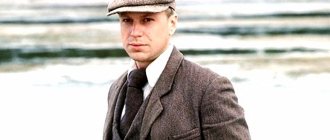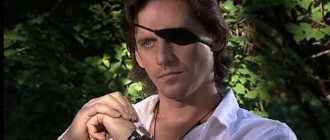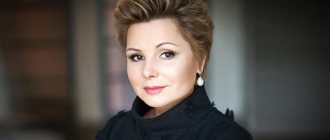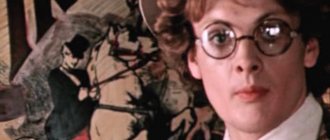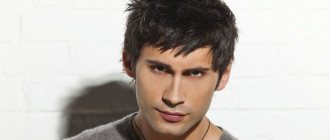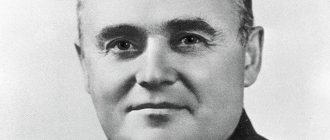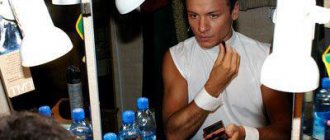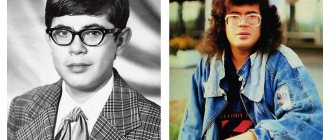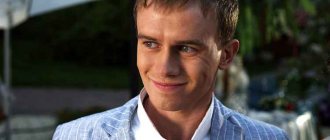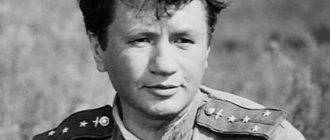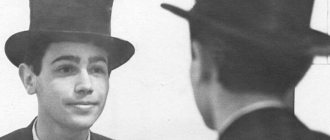Biography of Yuri Luzhkov
Yuri Mikhailovich Luzhkov is the ex-mayor of Moscow. He held this post for 18 years: from 1992 to 2010. He was removed from his post early with the wording “due to loss of confidence” by order of President Dmitry Medvedev.
Former Moscow Mayor Yuri Luzhkov (1992 – 2010)
The period of Luzhkov's mayorship can be discussed for hours. But it is impossible not to admit that during his administration the capital acquired authority on a federal and global scale, Moscow turned into the financial center of Russia, and the urban planning scope of the mayor was amazing - on his initiative the city acquired a monorail road, the Moscow Ring Road and the Third Ring, and the coverage of the metro was expanded , emergency five-story buildings were resettled, the Manege, the Bolshoi Theater, and the Cathedral of Christ the Savior were restored - and this is only a small part of Luzhkov’s ambitious projects.
Yuri Luzhkov revealed the secret of his resignation: “This is revenge”
Luzhkov's farm is not just in the provinces. Even by local standards, this is a real wilderness. It’s almost two hours from Kaliningrad by car. Dunes and Baltic are even further away. The border with Poland is a stone's throw away, but in the current conditions this is also not a plus. After the introduction of sanctions, commercial and tourist flows sharply decreased (in both directions) and the border cities again returned to the state of 1946, when the annexation of the northern part of East Prussia to Russia provoked their desolation and decline.
Having passed the regional center of Ozersk, the driver makes a sharp turn to the left and, having driven a few hundred meters more, slows down near a complex of stone buildings, whose size indicates a rich and glorious past, and the sound of hammers and piles of building materials - about hopes for an equally worthy future. This is the Weedern estate, known since the 17th century. Until the end of World War II, it belonged to the descendants of the German horse breeder Eberhard von Zitzewitz. And now it belongs to the former mayor of Moscow Yuri Luzhkov. Fate often presented him with surprises. And this is far from the most unexpected of them. “When I was appointed to head the Khimavtomatika Design Bureau, it was a surprise! And when they threw it at Mosagroprom! And this is a normal story,” the owner laughs.
photo: Natalia Gubernatorova
"Weedern" has been specializing in horse breeding since the century before last. The cost of some stallions exceeds a million.
Easily jumping out of the SUV (you simply can’t drive through the valleys and fields in another car), Luzhkov, who next year will celebrate another, very respectable anniversary, not paying attention to calls to “take a break from the road,” goes to inspect his possessions. Straight ahead are the stables. Weedern has historically specialized in raising Trakehner and Hanoverian horses. They are still grown here today. The cost of some stallions reaches a million rubles, but Luzhkov is now more interested not in them, but in a small house of bizarre architecture, nestled not far from the arena. With the same passion with which he once erected skyscrapers and built bridges, the former mayor is trying to breathe new life into its old walls. The manager of Veedern, Timur, complains about the lack of electricity and rotten boards, calling on the chef to show prudence, but he, carefreely waving his hand, rushes to the second floor, where, in his words, a unique room has been preserved - a smokehouse, in which the previous owners prepared simple delicacies.
photo: Natalia Gubernatorova
The former mayor spends the entire month of August in the fields: he says that it is more difficult to control a combine than an airplane.
“Apparently, the coachman’s family previously lived in this house,” Luzhkov explains, turning on the “flashlight” function on his iPhone. — After the restoration it will be exactly the same, only better.
The ex-mayor himself does not live in the manor’s estate (the three-story mansion, which housed a school in Soviet times, is boarded up), but in a former German office, from where the estate was managed under the Tsitsevits. The house is two-story and rather modest (although Luzhkov, out of old habit, calls it a “residence”): the dining room and master bedroom are on the second floor, guest rooms are on the first. Having opened the door to one of them, we find an unknown young man on the bed with a newspaper in his hands. “He probably came to work,” Luzhkov was not at all surprised.
— Do strangers often spend the night in your house?
- Well, where else should he spend the night? The place is remote,” shrugs the man, who just five years ago was under the watchful eye of armed guards, shrugs carefree.
In the courtyard of the house there is an oak tree, which is at least 250 years old, on the oak tree, as expected, there is a chain, and on the chain there is a cat... “He goes to the right - he starts a song, to the left - he tells a fairy tale, there are miracles, there is a goblin wandering around, Elena sits on the branches.” , - recites Yuri Luzhkov, replacing Pushkin’s mermaid with the name of his beloved wife. Her portrait, galloping at full speed on a bay stallion, is prominently displayed in the dining room, along with numerous Weedern awards. But lately Elena Baturina practically doesn’t come here, supporting her husband with calls, advice and, let’s be honest, finances. “Her soul does not lie,” the ex-mayor grows gloomy. To distract him from sad thoughts, I ask about the fate of the previous owners of the stud farm. It is known that in 1946, Anna von Zitzewitz, who until the last hoped that Prussia would remain part of Germany, was nevertheless forced to leave here in the last echelon...
“She came here about 10 years ago,” Luzhkov nods his head. - She was already quite old. I cried a lot. But at the same time, I was glad that the farm was not abandoned to the mercy of fate, like many local estates, and was even slowly being revived...
Next to "Weedern" there is a village of five houses. The buildings there are still German, but the people live in typically Russian ways. Which means they drink. And they also steal! “If all this is not protected, tomorrow there will be no stone left here,” says manager Timur and points to the drains covered with concrete slabs. The ex-mayor's neighbors have long since sold the metal pancakes from them for scrap metal. And when Luzhkov restored the barn, the forged gates and even the hooks on which they hung went there too. “Moreover, people drove a tractor and tore them out along with pieces of the walls,” says Timur. Neighbors are not hired to work on their farms not only because of their thieving nature, but also because of their habitual drunkenness. Luzhkov, as you know, has not drunk anything stronger than kefir for many years. And in “Weedern” he established complete prohibition. “Our technology is complex. If you hurt yourself, you’ll cause more trouble than on a warship,” he explains.
photo: Natalia Gubernatorova
Luzhkov buckwheat.
When Luzhkov led Moscow, his subordinates scolded him behind his back for being too active. Every day, except Sunday, the mayor came to work at 8 a.m. or traveled around the city, visiting problem areas. Moreover, these were not official events in the “came, saw, praised” style. The trips sometimes ended with hours-long meetings with a full debriefing. Five years of retirement have changed the scale, but not the habits of the former mayor. All the inhabitants of Weedern, from the manager to the seasonal workers, are now forced to get used to the peculiarities of his leadership style. “I know they don’t really like it when I come,” Luzhkov whispers in my ear. “They have their own, measured rhythm here.” And my awl is playing in one place.”
photo: Natalia Gubernatorova
It is no coincidence that Luzhkov breeds sheep of the famous Romanov breed: “They helped Russia during the war, and they will help now!”
Despite the late evening, he pulls us to the nearest field to show us how the rapeseed grows. Dry yellow stems with thin pods, similar to acacia fruits, were almost equal to human height. Having poured black peas into his palm, Luzhkov rejoices like a child: the butter should turn out good! Finding himself on the other side of the barricades, the former Moscow mayor experienced all the delights of business in Russian on his own skin. We return to the estate in complete darkness along the road built with Weedern’s money, and the owner complains about the intractability of local officials who refuse to sign the commissioning act. “They're just making fun of me! Either the width is not the same, or the drains are not the same...” Luzhkov gets angry, and I once again think about the vicissitudes of fate. He built hundreds of kilometers of roads during his life, received the nickname Lord of the Rings and... tripped over a piece of asphalt 300 meters long!
***
The next morning we meet early. Although Luzhkov got up even earlier. He wears an appropriate shirt with cows embroidered on the pocket and a traditional cap. More precisely, its summer version is made from coarse, dense flax. He had already talked with agronomists and found out that due to rainy weather, each ear of wheat lost from one to two rows of grain. However, crop prospects are still good.
photo: Natalia Gubernatorova
The main construction site of the farm is the house of the German coachman. Restoration work is in full swing.
— It definitely won’t be lower than last year! - the agronomists assure in unison, but Luzhkov is dissatisfied:
- So hello! We have done so much here in terms of technology, and they tell me that it won’t get any worse. It should be better than it was!
In the end, everyone agrees that five tons of grain per hectare will definitely work out, and then God willing. Luzhkov has been working at the combine for many years now and says that he really loves this job:
- Imagine: in front of you is a golden sea, swaying from the wind. You sail along it on this colossus and realize that you have grown a good harvest, that you are doing an important and useful job that is abandoned in the country, that you have given jobs and provided decent wages to people... All this is very stimulating and inspiring!
But what about the government support measures that are now being trumpeted on every corner? Haven't they reached the farmers?
“I don’t see much change,” Luzhkov shrugs. — Support from the region — 1200 rub. per hectare. For that kind of money you can only change into overalls! We ourselves spend 35 thousand rubles per hectare on preparing fields for sowing.
— What about loans?
- I forbade them to be taken! In America during the crisis, the rate was 0.25%, in Japan it was generally minus, the bank still pays you extra for taking a loan from them, and in our country, even after the key rate was reduced, the interest rates are crazy. I don’t want to support monetarism with my money!
In addition to rapeseed and wheat, Weedern grows oats, barley and buckwheat, which over time has every chance of becoming the hallmark of the farm. The former mayor had to give up his dreams of Nikita Khrushchev’s laurels several years ago, when, having planted and grown his favorite corn, he was unable to realize a very successful harvest. It turned out that no one in the Kaliningrad region and its environs needed the queen of the fields... But another expense item appeared - hay (it is eaten not only by horses, but also by the famous Romanov sheep, which are also raised by Weedern). “Having learned that Kosygin at one time organized and personally opened a large conference on grassland farming, with my last name, at first I was surprised at what to discuss there: take it and mow it! But it turned out that this is a whole science - different animals require different quality hay. And the land should not be waste: to grow good grass, you need to provide for a thousand little things. The Germans receive 10 tons of hay per hectare, and we only get 3 tons,” the ex-mayor says with enthusiasm, not paying attention to his bursting mobile phone. “It’s the governor calling you!” - warns the vigilant Timur.
See photo report on the topic: Former Moscow mayor Yuri Luzhkov is reviving the estate of a German equestrian
57 photos
The acting head of the Kaliningrad region, Nikolai Tsukanov, without knowing it, laid the foundation for a new specialization of “Weederna”. Having collected a decent harvest of buckwheat last year, Luzhkov, as usual, was going to sell it to Lithuania - there are no processing facilities in the region. But times were troubled: people were just sweeping cereals off the shelves, prices were rising, a shortage was looming... Tsukanov asked Luzhkov to hold back the “strategic reserve,” and he, as a statesman, agreed. Buckwheat lay like a dead weight at the elevator for several months, and the ex-mayor searched through cities and towns for equipment for processing it. The fact is that grains arrive from the fields in a dense box and are not suitable for consumption. Before selling, they must be put through a grain grinder and the wheat must be carefully separated from the chaff.
A unit suitable for price and technical characteristics was finally found by Ukrainian manufacturers, and although the country at that time had already embarked on the path of import substitution, Luzhkov, without thinking twice, shook hands... The history of Weedern itself is the history of international cooperation. It may be forced, but, as practice has shown, it is quite successful. German equipment from the first third of the last century still serves its owners well, regardless of title and political situation. Luzhkov proudly clicks the massive Siemens switches and shows how a Krupp conveyor delivers buckwheat from storage areas to the grain mill. The former mayor got the old elevator by chance (the previous owner refused to sell the land without it), and now he can’t get enough of it. The pipes in the new granary had to be replaced twice already, but they have been standing here since 1931 - and for the hell of it!
Watch the video on the topic: “Yuri Luzhkov showed hundreds of hectares of his land”
01:58
In addition to the Ukrainian grain grinder and German pipes, Luzhkov’s farm has an English grain dryer, as well as a number of devices designed by the ex-mayor himself. For example, a gearbox on a conveyor (the previous engine, according to him, was too complex) or a container for unloading buckwheat. Part of the buckwheat husk is used to heat steam boilers used in production. Some are sold to pharmacies for pillows. The owner himself believes that there is nothing unusual in this approach. Well, what does it mean for a person with a Soviet technical education to improve a gearbox? A couple of trifles! But local workers look with respect. “He’s such a guy! — a young guy in overalls shows his thumb. “You can’t even say that he’s a former bureaucrat!”
Luzhkov promises to feed the entire Kaliningrad region with his buckwheat in the near future. There will be enough capacity for everyone - for soldiers in local units, for kindergartens, and for pensioners. The first batches will be sold at fairs at a symbolic price - 39 rubles per kilogram. “Yes, this is not a business,” agrees the ex-mayor, being responsible for both buckwheat and the entire Weedern. — From the point of view of how the state treats the agricultural sector, there is not even a smell of business here. But this activity is important both in terms of food security and as a social component, so I do it.”
When, after a walk around the house, we sit down to drink tea with Luzhkov’s signature honey, I finally ask the question that has been tormenting me from the very beginning: how satisfied is the former mayor with such a life? What is it like - after communicating on an equal footing with the powers that be and managing a huge metropolis, find yourself driving a combine harvester in a godforsaken corner of the enclave? Luzhkov is silent for a long time, frowning, obviously searching for words.
“I’m satisfied with my current life,” he finally says. “But the state, it seems to me, should feel dissatisfied. This is not narcissism syndrome, and I’m not just talking about myself. We cannot recklessly ignore the experience of people like Shaimiev, Boos, Rossel, Filipenko. Thanks to their work, the country at one time was kept from collapse; they were prominent figures at both the regional and governmental levels. And now, anyone who can name the names of at least five governors should be given a bonus... In the USA, Kissinger is respected, his connections, experience and knowledge are used in the interests of the country, and Bush...
- You feel resentment...
“My resignation is injustice and lawlessness.” And revenge for my refusal to support Medvedev’s nomination for a second presidential term.
— Is the criminal case in which you were a witness closed?
- Don't know. Maybe it's not closed. It's good to have it on hand just in case. I want to ask this: five years have passed, has anyone from the Moscow government been imprisoned? Ryabinin (Luzhkov’s deputy in 2007–2010 - “MK”) was dragged through the courts for three years because he pursued the policy of the mayor of Moscow and stepped on the calluses of many, including government agencies. It was a purely political matter, a political order. As a result, Ryabinin was completely acquitted, and the investigators apologized to him. But who is responsible for this?
-Are you angry?
— Bitterness is not in my character. It's about disappointment. I absolutely don’t feel like a pensioner, I’m not going to lie upside down. Down - yes, this happens on the farm. But I don’t strive for a calm old age, since there is still enough dope.
- How old are you, Yuri Mikhailovich?
He thinks again, twirls in his hands a cup with the inscription “To the most talented sheep farmer”, which was made by his youngest daughter Olga, and a sly smile replaces the cold mask on his face:
- Probably still more than thirty. Well, let’s go, I’ll show you how buckwheat blooms...
Childhood, family, education
Yuri Luzhkov was born into the family of a carpenter on September 21, 1936.
Shortly before his birth, his father, fleeing hunger, moved from the village of Molodoy Tud, near Tver, to Moscow, where he got a job at an oil depot. His mother, a native of the Bashkortostan village of Kalegino, was a laborer at a factory in the capital. Yuri spent his childhood with his grandmother in the city of Konotop, graduated from the seven-year school there and returned to his parents in 1953. He finished grades 8-10 in Moscow, at school No. 529 (now No. 1259). Having entered the Moscow Institute of Petrochemical and Gas Industry named after. Gubkin, he began to earn money on his own. He worked as a loader at a station and as a janitor.
Yuri Luzhkov in his youth
He did not excel in his studies, but he was a diligent and hardworking Komsomol member, and was also known as a skillful organizer of public events. In 1954, together with one of the first student teams, he went to explore the virgin lands in Kazakhstan.
Scientific and political career
Yuri Luzhkov began his career as a junior researcher at the Plastics Research Institute, where he joined in 1958. Over five years of work at the research institute, he rose to the rank of deputy head of the technological process automation laboratory. The young scientist was noticed by the State Committee on Chemistry, and in 1964 Luzhkov headed its control automation department.
Yuri Luzhkov (left) – student of the Gubkin Institute
In 1971, Yuri Mikhailovich already headed a similar department in the USSR Ministry of Chemical Industry. As he climbed the career ladder, Luzhkov did not forget about his Komsomol duty: in 1968 he joined the Communist Party, in 1975 he became a people’s deputy of the Babushkinsky district council, in 1977 he became a deputy of the Moscow council.
As a deputy of the Supreme Council of the RSFSR of the 11th convocation from 1987 to 1990, Yuri Mikhailovich was among the “fresh personnel” whom the First Secretary of the Moscow City Committee of the CPSU Boris Nikolaevich Yeltsin included in his team. So, in 1987, 51-year-old Luzhkov was appointed First Deputy Chairman of the Moscow City Executive Committee. At the same time, he headed the city commission for cooperative and individual activities and took the post of chairman of the Moscow Agro-Industrial Committee.
“New Russian sensations”: “Luzhkov. Chronicles of the Pension Mayor" In 1990, on the recommendation of Yeltsin, the chairman of the Moscow City Council, Gavriil Popov, the future first mayor of Moscow, nominated Luzhkov to the post of chairman of the City Executive Committee. In 1991, the position of vice-mayor of Moscow was elective, and Yuri Mikhailovich was elected to this position in June of the same year. In July, he became prime minister of the government, a new executive body that replaced the Moscow City Polkom.
Yuri Luzhkov as Deputy Mayor of Moscow
The events of August 1991 put Yuri Luzhkov and his pregnant wife in the ranks of the defense of the Government House: they took an active part in all the events and actions of that epoch-making event.
Career
Immediately after receiving his diploma, Yuri Mikhailovich Luzhkov becomes a junior researcher at the Plastics Research Institute, where he is promoted to group leader and deputy head of the laboratory. His further career developed progressively.
Politician Yuri Luzhkov / President of Russia
In 1964, Luzhkov took up the position of head of the department for improving management of the State Committee for Chemistry, and seven years later he became head of the automated control system of the Ministry of Chemistry. industry of the USSR, and then director of the Khimavtomatika division of OKBA. Soon followed by a promotion to the position of director of NPO Khimavtomatika.
Since the mid-80s, Luzhkov was again transferred to serve in the Ministry, this time to a senior position in the department of the Ministry of Chemical Industry. A year later, Yuri Mikhailovich gets a job in the Moscow City Executive Committee, where he first becomes deputy head and then receives the position of acting chairman. In 1991, Luzhkov became prime minister of the Moscow government, essentially performing the function of mayor.
Yuri Luzhkov – Mayor of Moscow
In 1992, spontaneous food shortages began in Moscow, coupons were introduced, and the population was indignant. The current mayor, Gavriil Popov, resigned. On June 6, 1992, by decree of Russian President Boris Yeltsin, Yuri Mikhailovich Luzhkov was appointed the new mayor of the capital.
Yuri Luzhkov and Boris Yeltsin
This event became significant in his life, because he spent the next 18 years at the head of the capital, being re-elected 3 times (in June 1996, December 1999 with 69% and December 2003 with 74% of the votes) always with a large lead over his competitors. The mayor always played political games on Yeltsin’s side: he supported him in 1993 during the dispersal of the Supreme Council of the Russian Federation and the Congress of People’s Deputies, and in 1996 during the presidential campaign; openly approved of military actions in Chechnya, participated in the creation of the “Our Home is Russia” party, and in 1995 promoted it in the Duma elections.
Yuri Luzhkov stood at the helm of Moscow for 18 years
But 1999 led to a split in the strong tandem. Yuri Mikhailovich, together with Yevgeny Primakov, took the helm of the Fatherland political party. His criticism of the current president and calls for his early resignation were unexpected. The mayor's career did not suffer at all. On the contrary, having become a member of the Federation Council, as the head of a subject of the federation, Luzhkov held significant positions - he was a member of the committee on the budget, currency regulation, tax policy, and banking.
Yuri Luzhkov inspects the reconstruction of the Moscow Ring Road (1995)
In 2001, Yuri Mikhailovich was elected co-chairman of the United Russia party, and all his activities became aimed at supporting Vladimir Putin. After the election of the post of mayor of Moscow was abolished in June 2007, President Vladimir Putin introduced Luzhkov as a candidate to the deputies of the Moscow City Duma, and the deputies gave him the powers of mayor for another four years.
Luzhkov was a devoted ally of Putin
Yuri Luzhkov: career in photographs
Luzhkov's life as a politician began with the birth of the new Russia and continued under three presidents. Remaining in the same post for 18 years, Yuri Luzhkov either soared to the heights of power and popularity, then faded into the background, but was always a bright hero for the media.
Illustration copyright Alexander Yakovlev/TASS Image caption Moscow. Serebryany Bor, 1991. Chairman of the Executive Committee of the Mossovet Yuri Luzhkov (left) and Chairman of the Mossovet Gavriil Popov (center) before the start of a friendly volleyball match between the teams of the Mossovet and the Council of Ministers of the RSFSR. Image copyright Albert Pushkarev/TASS Image caption Poklonnaya Gora, Moscow, 1992. Mayor Luzhkov and Vladimir Resin are already inspecting the protracted construction of the museum and Victory Park. Copyright holder of the illustration Alexander Nemenov/TASS Image caption Moscow, Tverskaya, September 6, 1993. On City Day - a holiday invented by Yeltsin when he was the first secretary of the Moscow city committee of the CPSU - with Russian President Yeltsin Image copyright DIMA TANIN/Getty Images Image caption Moscow, the same Tverskaya Street, late September 1993. Having issued decree No. 1400 on the dissolution of the Supreme Council, President Yeltsin went to “walk” in the company of Luzhkov, as well as with Defense Minister Pavel Grachev and the head of Ministry of Internal Affairs Viktor Erin. The mayor of Moscow remained on Yeltsin’s side throughout the days of the constitutional crisis, the riot and the shooting of the parliament building. Copyright holder of the illustration Alexander Sentzov/TASS Image caption Moscow circus on Tsvetnoy Boulevard, 1996. With the director of the circus, actor Yuri Nikulin Illustration copyright ALEXANDER NEMENOV/Gerry Images Image caption Alexander Solzhenitsyn's anniversary at the Taganka Theater, 1998. The author of “The Gulag Archipelago”, the Nobel laureate refused to receive Russia’s highest order from Yeltsin, and willingly embraced Luzhkov Copyright holder of the illustration Getty Images Image caption Fatherland Party Congress, 1999. Political heavyweight Yuri Luzhkov is preparing to compete for the presidency. (On the right in the photo is the rector of Moscow State University Viktor Sadovnichy). Later, Fatherland, together with the All Russia party of governors, will quickly unite with Putin’s Unity movement, and the United Russia party will be born. Copyright holder of the illustration Oleg Nikishin/Getty Images Image caption Orekhovo-Zuevo electric train - Moscow, 2000. The day before the presidential elections, acting President Vladimir Putin went to talk with workers of the Moscow region. The mayor of Moscow accompanied him Image copyright Getty Images Image caption Moscow Beer Festival, 2001 Image copyright DENIS SINYAKOV/Getty Images Image caption XXVI Moscow International Film Festival, 2004 Image copyright Alexander Hassenstein/Getty Images Image caption IOC session in Berlin, 2005 Advertising Moscow's bid for the right to host the 2012 Olympic Games, Luzhkov demonstrates a model of the "Olympic River": according to the project, all sports facilities and the Olympic village were to be located along the Moscow River, and the competitions could be reached by boat. However, the Olympics were then given to London. Image copyright Getty Images Image caption Moscow synagogue, 2006. With Israeli Prime Minister Ehud Olmert. Olmert would later be sentenced to prison for corruption. Image copyright AFP/Getty Images Image caption Foreign Literature Library, 2007. With Venezuelan leader Hugo Chavez Image copyright YURI KADOBNOV/TASS Image caption Kremlin Cup, 2007. With winner Elena Dementyeva and finalist Serena Williams Illustration copyright VLADIMIR RODIONOV/Getty Images Image caption In Tsaritsyno Park with Putin on the day of the celebration of the 860th anniversary of Moscow. What Catherine the Great rejected, Luzhkov completed. Copyright holder of the illustration Getty Images Image caption City Day, 2006. With Patriarch Alexy and President Putin Image copyright Getty Images Image caption City Day, 2009. With the new head of the Russian Orthodox Church and the new president Illustration copyright Grigory Sysoev/TASS Image caption Moscow City Hall, White Hall, 2007. For a fifth term, Luzhkov was not elected by popular vote of Muscovites, but was appointed on the proposal of the president. Copyright holder of the illustration DMITRY ASTAKHOV/Getty Images Image caption Slavyansky Boulevard metro station, 2008. On the day of the opening of the new station, Luzhkov outlines to Medvedev a plan for the defense of Moscow in the event of a continuation of the war with Georgia. Image copyright Getty Images Image caption Brescia, Italy, 2008. At the vintage car festival with his wife Elena Baturina Illustration copyright Alexei Pavlishak/TASS Image caption On board the cruiser "Moscow", Sevastopol, 2007. Long before the annexation of Crimea, Luzhkov proclaimed the slogan “Sevastopol is a Russian city,” for which Ukraine declared him persona non grata Illustration copyright Sasha Mordovets/Getty Images Image caption Cathedral of Christ the Savior, 2010, Easter. There are six months left before retirement. The temple, blown up by the Bolsheviks, was rebuilt by Luzhkov in the 1990s with voluntary and forced donations from Moscow businessmen. Image copyright Getty Images Image caption At a UNICEF session, Moscow, September 27, 2010. The next day, Medvedev will issue an unprecedented decree on Luzhkov’s resignation from the post of mayor of Moscow “due to loss of trust.” Image copyright Getty Images Image caption Weedern mushroom farm in Ozersk, 2020. With the governor of the Kaliningrad region. In retirement, Yuri Luzhkov founded a business growing oyster mushrooms, soft cheeses, buckwheat and breeding horses. Image copyright Getty Images Image caption Moscow, Kremlin, 2020. Luzhkov regarded the awarding of the Order of Merit for the Fatherland, IV degree, as political rehabilitation Copyright holder of the illustration Mikhail Svetlov/Getty Images Image caption Yuri Luzhkov will be buried at the Novodevichy Cemetery in Moscow
***
Sevastopol issue
Yuri Mikhailovich always expressed himself towards Ukraine without proper diplomacy. On May 11, 2008, while visiting the celebrations of the 225th anniversary of the Black Sea Fleet in the city of Sevastopol, Luzhkov from the podium did not forget to remind the audience that the issue of the city’s ownership has not yet been resolved, that Russia has all state rights to its territory. Yuri Luzhkov about Sevastopol In addition, criticism was voiced of the “legalization” of UPA-UNSO soldiers and integration into NATO. And finally, he threatened to raise the issue of revising the friendship treaty between the countries with the Russian government.
“Honey Festivals” by Yuri Luzhkov
On May 12, the SBU declared Luzhkov persona non grata, beginning to clarify the circumstances of “provocative statements of a political nature.” And only when Viktor Yanukovych took over the post of President of Ukraine, this status was removed from Luzhkov.
Chief farmer of the Kaliningrad region
Yuri Mikhailovich bought the former estate "Weedern". The following is known about him:
- located in the Kaliningrad region near Ozersk;
- area 5,000 hectares;
- once belonged to the oldest Prussian aristocratic family.
The stud farm here was founded by Alexander von Neumann in 1832. The next owner was his son-in-law Eberhard von Zitzewitz. In 1934 he died, and his second wife Anna took over the management and took the best horses to western Germany. Anna von Zitzewitz left the estate in 1946, and a state farm was formed on its territory. Since 1963, the estate building housed the Suvorov school, a canteen, a communications department, and a club. Currently the mansion is empty.
The company "Private Stud Farm Weedern" LLC was registered in 2007. The founder is listed as Yu. M. Luzhkov, and the general director is T. A. Shogenov.
The former mayor lives at the stud farm and restores farmland. The farm is large, more than $5 million has been invested in it.
The retired mayor likes to share his experience of raising agriculture in his homeland from its knees. He does this in the context of his estate. The farm is growing. New commercially profitable objects appear on it:
- grain storage;
- cheese factory;
- buckwheat processing plant.
Photo: View of the sheepfold. Source: official website “Honey Meadows”
Buckwheat “from Luzhkov” is grown and packaged here. It became an absolute monopolist in the region in 2020.
Dismissal
September 2010 became fatal for Luzhkov.
Russian central television channels launched a number of documentaries, where they harshly criticized the mayor’s activities. Business, money, connections of Luzhkov himself and all members of his family were publicly discussed. “Mayhem. Moscow, which we lost”, “It’s about the cap” - they crushed trust and undermined the authority of Yuri Mikhailovich with a merciless steamroller. 2010: Yuri Luzhkov was dismissed from the post of mayor of Moscow. In response to a letter to the president dated September 27, 2010, in which the mayor expressed indignation at the criticism made against him on television, Dmitry Medvedev signed a decree “On the early termination of the powers of the mayor of Moscow.” The basis for this decision was the “loss of confidence of the President of the Russian Federation.” Experts immediately dubbed Luzhkov a victim of Putin’s behind-the-scenes intrigues. Alleging threats against his family, the ex-mayor moved to live in London. Most of Luzhkov’s associates were removed from their positions by the new mayor Sergei Sobyanin, and criticism of “Luzhkov’s policies” did not leave the pages of the press, online media and television screens for a long time.
In 2020, the ex-mayor wrote an autobiography in which he honestly spoke about the reasons for his resignation. According to him, he was fired when he refused to support Dmitry Medvedev, who intended to run for a second term.
Personal life of Yuri Luzhkov
Yuri Luzhkov formalized his relationship with his first (except for a very short and childless marriage with Alevtina Luzhkova), his classmate Marina Bashilova, in his fifth year at the institute. The girl came from a wealthy family; her father was Deputy Minister of the Petrochemical Industry of the USSR
Yuri Luzhkov with sons from his first marriage.
They had two sons - Mikhail (born 1959) and Alexander (born 1973). In 1988, Luzhkov was widowed - Marina Bashilova died of liver cancer.
Yuri Luzhkov's first wife died in 1988
The second wife, Elena Baturina, is a businessman and has repeatedly topped the Forbes “female” rating.
Yuri Luzhkov and Elena Baturina
She gave him two daughters - Elena and Olga.
Daughters of Yuri Luzhkov from his marriage to Elena Baturina
Personal life
Luzhkov met his first wife Alevtina during his student years. They did not have any children together. And the marriage itself turned out to be short. His second wife was Marina Mikhailovna Bashilova, who bore him two sons - Alexander and Mikhail. Unfortunately, she died at age 54 from an aggressive malignant liver tumor.
Yuri Luzhkov and Elena Baturina
For the third time, fate smiled at Yuri Mikhailovich in 1991, when he married Elena Baturina. The marriage turned out to be strong, Yuri Luzhkov no longer thought about changes in his personal life. Having given birth to two daughters (Elena and Olga), Elena became a faithful wife and reliable business partner for her husband. The couple got married in 2020 - exactly a quarter of a century after the wedding. For several years in a row, Elena Baturina ranked first in the top 10 richest women in Russia according to Forbes. Her fortune is estimated at $1 billion.
For a long time there were rumors in the press that Luzhkov’s nationality was Jewish, and that his real name and surname were Moisha Katz. Considering that Yuri Mikhailovich’s father is from the village of Molodoy Tud, which is located not far from Tula, and his mother is a native of the distant Bashkir village of Kalegino, such speculation was considered someone’s joke.
Wife and daughters of Yuri Luzhkov
This topic is periodically raised by Luzhkov’s relatives at anniversaries and family events. Most often it serves as a reason for good jokes and general fun.
Unfortunately, his advanced age and excess weight (with a height of 174 cm, Luzhkov’s weight reaches 94 kg) made themselves felt, and at the end of December 2016, Luzhkov felt unwell during a visit to the reading room of the Moscow State University library. The condition turned out to be so bad that the staff of the educational institution had to call the resuscitation team.
Former Moscow Mayor Yuri Luzhkov
Over the next 24 hours, Yuri Mikhailovich suffered a brief clinical death, but was successfully brought back to consciousness by Moscow doctors. Now his health is not in danger.
Last years of life and death
In 2020, Yuri Luzhkov, one of the main symbols of post-Soviet Russia, celebrated his 80th birthday. On this significant date, Vladimir Putin awarded him the Order of Merit for the Fatherland, IV degree.
Yuri Luzhkov celebrated his anniversary at a cleanup event
After his resignation, the politician took up farming, especially growing buckwheat. He said that he provides grain for the Red Banner Baltic Fleet.
In 2020, Yuri Luzhkov “returned from timelessness”
On December 23, 2020, the media reported the emergency hospitalization of Yuri Luzhkov. He fainted in the Moscow State University library. The mayor was taken immediately to intensive care.
In the last years of his life, Yuri Mikhailovich led a non-public lifestyle. On December 10, 2020, the former mayor of the capital passed away. He was 83 years old. According to media reports, he underwent heart surgery in a German clinic, and his wife was nearby. Although the doctors' forecasts were encouraging, and the operation itself was successful, the politician did not recover from anesthesia.
Life after returning to Russia
Returning to his native Russia, Yuri Mikhailovich decided to settle in the Kaluga region. Here he seriously began breeding bees, but, apparently, this course of affairs did not suit him either - he wanted something more.
After a short time, Luzhkov moved to the Kaliningrad region and finally settled not far from Ozersk. Here he found something he liked: he bought an old horse farm, which had been destroyed back in the 90s, and began restoring it together with his wife Elena Baturina. Previously, this was the estate of Anna von Zitzewitz, a representative of an old Prussian family who left this estate in 1946.
Only the young will understand. Nikita Presnyakov explained why not everyone loves his music
The student who became a mother was condemned. It turned out that the girl was keeping a secret about her daughter.
Life doesn’t work out: why Harry and Meghan “endure” life in Los Angeles
In the last years of his life, Luzhkov was engaged in breeding expensive sports horses, Romanov sheep and pedigree cows. On the fields of the estate, Luzhkov was engaged in growing crops, and he also organized the production of Honey Meadows cheese. Among other things, the former mayor of the capital decided to restore the estate, giving it its former appearance. Rumor has it that once the former owner came to the restored estate - she was very pleased that everything in her native corner was restored and functioning.
Workers have noted many times that Yuri Mikhailovich spends a lot of time on the farm - he literally cannot sit in one place, he wants to lead and command. Despite this, no one complained about the salary. The ex-mayor's widow treated her husband's occupation solely as a hobby, despite the fact that his farm produced a large amount of natural products: buckwheat alone could feed half of the Kaliningrad region. Luzhkov sold all his products in local stores, offering them at social prices.
